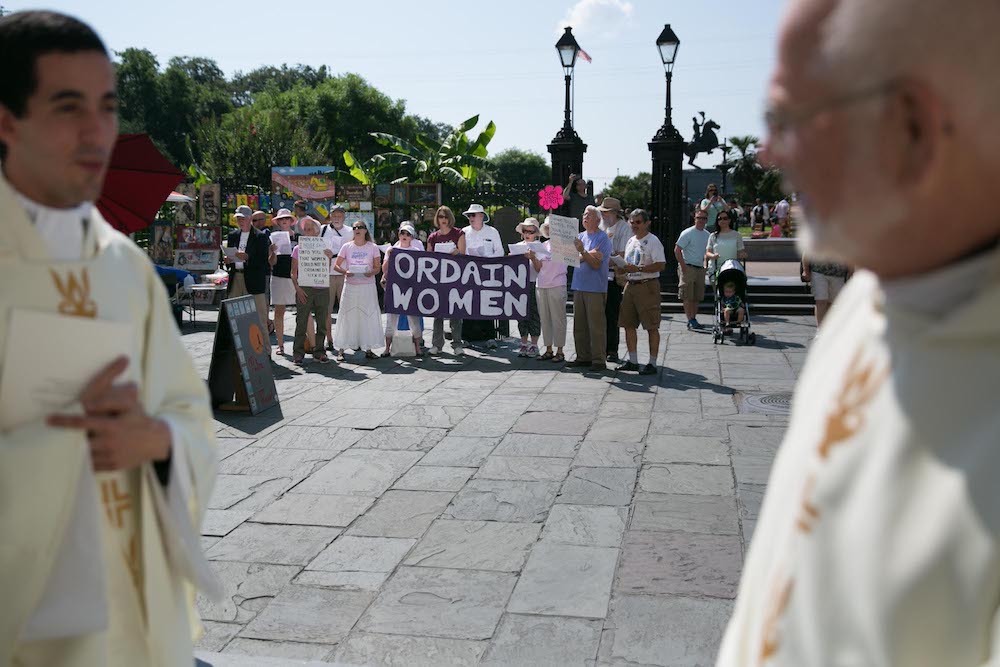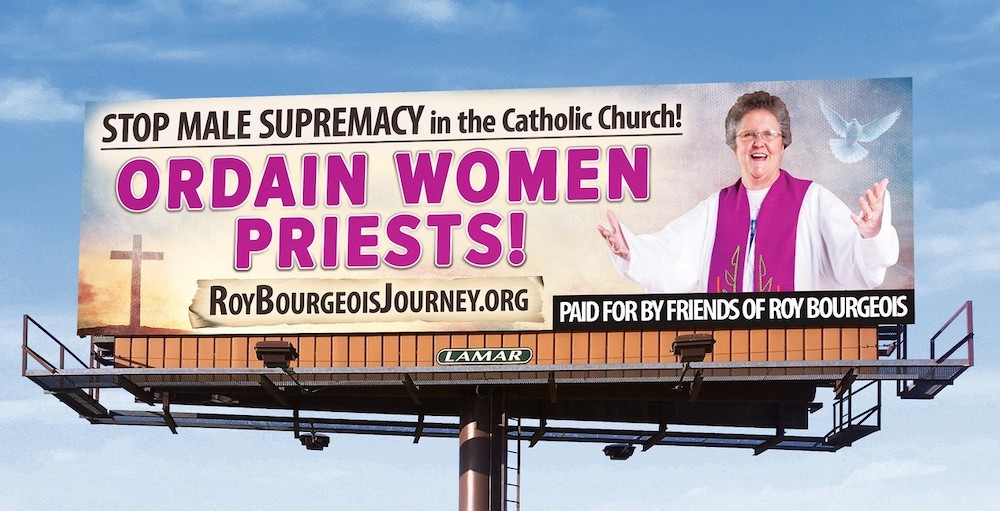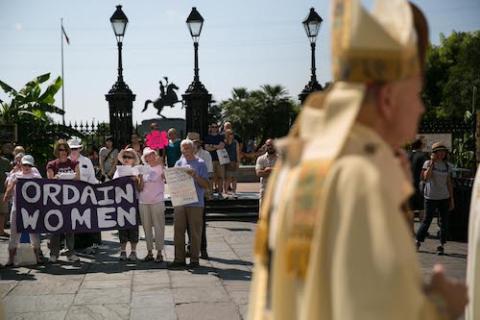
Supporters of women's ordination gather in Jackson Square in New Orleans outside the St. Louis Cathedral during the archdiocese's ordination ceremony for new priests in June 2015. Before the pandemic, the group held this prayer vigil annually to show solidarity with Catholic women who are called to ordination. (Gabriela Arp)
While raising her three children in the Catholic Church, New Orleans high school teacher Jennifer Molina was disturbed by the absence of women's ordained leadership.
"I'm taking my kids to Mass and having them baptized, and I just felt really uncomfortable with the idea that I'm raising these kids to think this is OK, that women are not allowed to be priests," Molina said.
Having witnessed the sex abuse crisis unfold, her home diocese close after Hurricane Katrina, and the recent bankruptcy of the New Orleans Diocese, Molina, whose children are now grown up, feels that the church is in crisis. Since 2012, she has worked to publicly advocate with a group of Catholics in her region who like her, feel that ordaining women to the priesthood would improve the church.
Since the pandemic began, Molina's advocacy for women's ordination has shifted from in-person actions to supporting a new billboard campaign that laicized priest Roy Bourgeois kicked off last fall. In January, New Orleans began hosting the second of three billboards in the city that read: "Stop Male Supremacy in the Catholic Church! Ordain Women Priests!"
South Bend, Indiana (near the University of Notre Dame), Lafayette, Louisiana, and Philadelphia were the first cities to host the billboards.
The messaging of "male supremacy," Bourgeois, said, felt like an important way to communicate his feelings about the Catholic Church in a timely way. Bourgeois, who was a priest in the Maryknoll order for over 40 years, has advocated for women's ordination for several decades and has personally experienced what he calls the "seduction of male supremacy" in the church.
"We have a huge debate going on right now about white supremacy, racism. I just thought wow, it really captures the grave injustice in the Catholic Church," Bourgeois told NCR. "[It's] a good way to capture the issue of sexism, the all-male priesthood and addiction to power — male supremacy."

Billboards showing Judy Heffernan, who was ordained in 1980 by an intentional eucharistic community and is now a member of Southeastern Pennsylvania Women's Ordination and the Women's Ordination Conference, are up in New Orleans, scheduled for two months. They are located off of Interstate 10, at exit 235B near Canal Street, exit 254 and exit 238. (Courtesy of Lamar Advertising)
While he was a practicing priest, Bourgeois recognized that excluding women from his occupation was a "justice issue," no different from his work with the SOA Watch movement exposing the injustices of U.S. imperialism and war.
"Who are we as men to say our call from God to the priesthood is valid, but a woman's call is not?" Bourgeois said he realized, after several encounters with women who told him they also are called to the priesthood.
"Excluding women from the priesthood is no different than when women could not vote, or when they couldn't be medical doctors or lawyers," Bourgeois said. "We make the issues so complicated. Racism is a sin, it's wrong, it's an injustice. Sexism is a sin, it's wrong, it's an injustice."
Bourgeois met women who fulfilled their call to be priests, by being ordained through the Association of Roman Catholic Women Priests, Roman Catholic Women Priests, and Women's Ordination Conference (WOC), organizations not sanctioned by the Vatican. The billboard includes a photo of one of these women, Judy Heffernan, who was ordained in 1980 by an intentional eucharistic community, and is now a member of Southeastern Pennsylvania Women's Ordination and WOC.
After attending the 2008 ordination of his friend, Janice Sevre-Duszynska, Bourgeois received a letter from the Congregation of the Doctrine of Faith asking him to recant his position or face excommunication. Roy refused on the grounds that he was following his conscience, and in 2012 was officially laicized, excommunicated and dismissed from the Maryknoll order.
Bill Quigley, a law professor at Loyola University New Orleans and long-time advocate for women's ordination, called the billboard campaign "a really exciting educational opportunity."
Quigley has joined Molina and a group of progressive Catholics from organizations including Women's Ordination Conference, Hope House, Pax Christi and Call To Action, in actions supporting women's ordination for many years.
Advertisement
Prior to the coronavirus pandemic, Quigley, Molina and others gathered each year at the ordination of priests in front of St. Louis Cathedral in Jackson Square to show public witness to the call of women to be priests, and to pray for the priests being ordained.
Quigley said of the public advocacy and billboard, that beyond intellectual learning, "there's something powerful in seeing."
When news of Lafayette's billboard began circulating, Molina and Quigley asked Bourgeois how they could help. Molina then contacted the approximately 100 people on an email list from New Orleans who support women's ordination. The group has raised $4,730 so far from 23 individuals to send to Bourgeois, who funded the first billboards.

Supporters of women's ordination gather in Jackson Square in New Orleans outside the St. Louis Cathedral during the archdiocese's ordination ceremony for new priests in June 2015. (Gabriela Arp)
Billboards are scheduled to go up in Pittsburgh in February and in Buffalo, New York, in April. Bourgeois is currently brainstorming other cities in which to put up billboards and encourages people to organize their own cities' billboards.
Until they can once again do in-person actions, including, Bourgeois hopes, a future gathering in front of the Vatican Embassy in Washington, D.C., billboards and op-eds will have to do.
Supporting women's ordination drastically altered Bourgeois' life, and though the cost has been extremely painful, he said he has "no regrets."
"I'm just so grateful I did what I did, and not died as a priest ending my life in silence," Bourgeois said. "What it comes down to is conscience. It's liberating; it's sacred."
Said Molina: "If you really care about the church, then you would say if you think something is wrong. I hope it [the billboard] just changes some people's hearts and minds."
[Sophie Vodvarka is a freelance writer based in Chicago who covers travel, spirituality and current affairs. Follow her on Twitter: @SophieVodvarka.]






